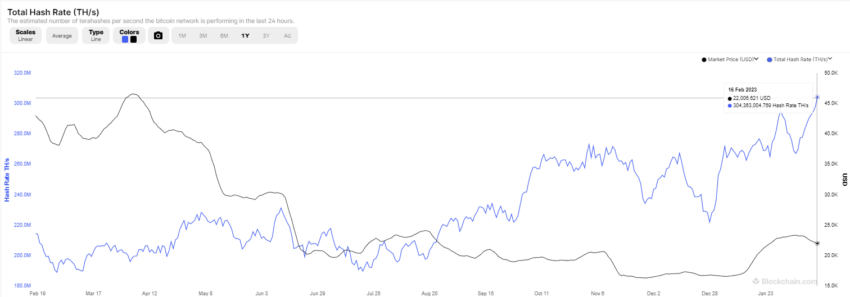A judge approved the mining firm, Compute North’s restructuring program after it filed for bankruptcy in September 2022.
According to the mining firm’s lawyer James Grogan, the firm reportedly reached agreements to pay three final firms after selling assets to cover $250 million in secured debt.
Compute North Will Settle With Marathon Digital for $40 Million
Twelve creditor firms, including Marathon Digital, had to settle for claims for the judge to approve the plan. Compute North creditor Marathon had to settle for $40 million despite being owed $50 million.
The last three firms to agree to the restructuring plan were customer Decimal Digital, mining infrastructure developer Corpus Christi Energy Park, and BitNile.
Customers Decimal Digital and BitNile had tapped Compute North to host mining rigs it supplied, while infrastructure builder Corpus Christi Energy Park agreed to a claim of $5 million. Decimal Digital will receive its machines back, while BitNile will settle for a $1 million claim.
Compute North filed for bankruptcy in Sep. 2022 partly due to energy-related delays in bringing Marathon Digital’s machines online. At the time, chief marketing officer Kristyan Mjolsnes said the firm had over 200 creditors. No mention has been made of liquidations, which means that the firm will likely continue doing business, albeit on a reduced scale.
Mining Industry Consolidates After Brutal Bear Market
The Bitcoin mining industry has recently undergone consolidation as smaller miners seek to remain in business following a tough 2022 that saw confidence in the crypto industry left in tatters.
Argo Blockchain recently borrowed money from and sold its flagship Helios mining facility to crypto financial services firm Galaxy Digital to ensure its survival. Other firms either returned or sold mining machines to lenders in exchange for extinguishing debt.
Most recently, Canadian mining outfit Hut 8 merged with American miner U.S. Bitcoin Corp in a deal that jointly values the firms at $990 million. Hut 8 was an Ethereum miner before the blockchain changed its consensus mechanism from proof-of-work to proof-of-stake.
According to U.S. Bitcoin Corp’s co-founder and CEO Mike Ho, Hut 8 survived the recent bear market through discipline. At the same time, other larger public miners borrowed excessively to fund expensive mining rig purchases.
A recent analysis by Hashrate Index on the debt of mining firms singled out public miner Core Scientific as the most indebted miner, owing $1.3 billion, with Marathon Digital close behind at $851 million.
Proof-of-Stake Crackdown Coincides With Mining Boom
Proof-of-stake chains are secured by participants who lock up or stake tokens in a smart contract on the chain to earn rewards for validating transactions.
While different forms of staking exist, some crypto exchanges ease the burden of earning rewards through custodial staking services. These staking services allow customers to play a part in validating transactions without setting up their infrastructure.
Recently, the U.S. Securities and Exchange Commission filed an enforcement action against crypto exchange Kraken, alleging that its staking services constituted as an unregistered security. Kraken settled with the SEC for $30 million, but the lawsuit may be an unexpected boon for Bitcoin miners.
Since the start of the year, the total Bitcoin hashrate, a measure of computing resources deployed to validate transactions on the network, has risen from 253,000 petahashes per second to 304,000 petahashes per second.

The Bitcoin Hashprice Index, which measures how much miners can earn from a given allocation of computational resources measured in petahashes per second, is up 30% this year to $78.45 per petahash per second per day.

A recent NFT-like project on Bitcoin, called Ordinals, caused miners to reap $114,000 in transaction fees on Feb. 14, 2023.
For Be[In]Crypto’s latest Bitcoin (BTC) analysis, click here.
Disclaimer
In adherence to the Trust Project guidelines, BeInCrypto is committed to unbiased, transparent reporting. This news article aims to provide accurate, timely information. However, readers are advised to verify facts independently and consult with a professional before making any decisions based on this content. Please note that our Terms and Conditions, Privacy Policy, and Disclaimers have been updated.


